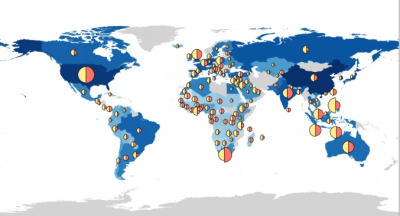


A study analysing academic promotion criteria across 121 countries, published in Nature on 22 January 2025, sheds light on how researchers are evaluated globally. The research, co-authored by Yensi Flores Bueso (Co-Chair, Global Young Academy) and a team of researchers affiliated with the Global Young Academy (GYA), explored variations in the criteria used by institutions to advance researchers to full professorship. The study examines 532 policies from nearly 250 universities and government agencies, revealing significant regional differences in how research output, societal impact, visibility and career development are assessed.
This comprehensive analysis aligns with ongoing efforts by IAP, the GYA and the International Science Council (ISC) to rethink and reform research evaluation practices. Their collaborative initiative has emphasised the need for equitable, inclusive and responsible approaches to assessment that reflect the diverse research cultures and systems worldwide.
The study found that while publication and citation metrics remain common, they are not universal. Other factors, such as mentoring, administrative contributions and societal impact, play a significant role in many regions. For instance, institutions in Europe place greater emphasis on visibility and engagement compared to Asia, where research outcomes are prioritised. Latin America relies less on output metrics, while Oceania emphasises outcomes and impact.
However, the reliance on metrics such as journal impact factors continues to raise concerns. As highlighted by the GYA-IAP-ISC initiative, evaluation systems that overly focus on quantitative metrics can perpetuate inequities, particularly disadvantaging researchers in low- and middle-income countries. The need for reform is clear: evaluation practices should align with institutional goals and stress equity, inclusivity and research integrity.
The IAP, GYA and ISC have been at the forefront of efforts to reimagine research evaluation for the 21st century. Their 2023 report, The Future of Research Evaluation: A Synthesis of Current Debates and Developments, set the stage for reform by identifying critical gaps and opportunities. The follow-up report, Snapshots of Reform: Researcher Evaluation within Science Organisations, highlights innovative approaches being piloted globally.
The publication of this Nature article reinforces the urgency of reforming research evaluation to address today’s challenges. IAP, GYA and ISC remain committed to mobilising the global research community to develop and adopt responsible, inclusive and impactful evaluation practices.
Read the full research published on Nature here.
Read the summary article on Nature here.
For more information on IAP’s initiatives and reports on research evaluation, read here.
